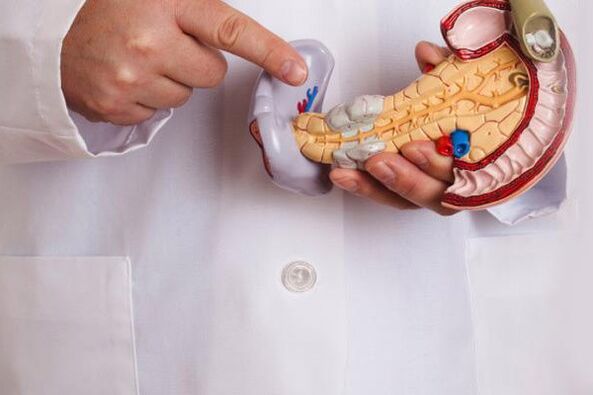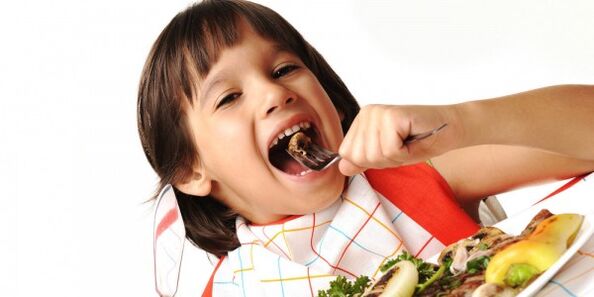Diet for pancreatitis is an important factor in successful treatment, so compliance with dietary restrictions makes it possible to lead a fulfilling life and reduce the likelihood of recurrence.
Pancreatitis is inflammation of the pancreatic tissue, accompanied by impaired secretion of digestive enzymes, severe pain, changes in stool, and vomiting. This leads to a pathological metabolic disorder and can lead to the development of diabetes mellitus. The main factors in the onset of pancreatitis are: overeating, abuse of fatty foods and alcohol.
It is necessary to follow a diet for pancreatitis for a long time. Acute inflammation requires restriction of the diet for 6-9 months, whereas in chronic pancreatitis diets are followed for several years or a lifetime.
power specifications

Approaches to prescribing a diet for pancreatitis depend on whether the inflammation is in acute or chronic form. Doctors note the positive effect of diet on pancreatitis. It allows you to quickly overcome acute inflammation, avoid complications and prolong the period of remission in a chronic process.
Features of the diet:
- Within 2-3 days after an attack of acute pancreatitis, you should completely refuse food. Thus, the pancreas is rested. Therapeutic fasting involves the use of liquid in the form of a glass of non-carbonated alkaline mineral waters, weakly brewed tea or rosehip infusion 5-6 times a day.
- On the fourth day after therapeutic fasting begins, the gradual introduction of solid foods into the diet begins. As a rule, these are low-calorie dishes without salt, which gradually increase the secretion of gastric juice.
- With pancreatitis, the way you prepare food is important. Steaming is recommended, as food prepared in this way contains all the necessary substances and does not harm the digestive system.
- Food should not be chilled or hot, the optimal temperature is close to body temperature. In this case, the food should be grated or semi-liquid.
- Diet for pancreatitis even limits the consumption of dietary foods. They eat small portions at least five times a day.
Diet excludes food:

- oily;
- fried;
- hot sauces and seasonings;
- sour juices;
- canned food, pickles;
- smoked meats;
- confectionery;
- cocoa, chocolate;
- alcohol.
The energy value of such foods should be at the level of 2500 kcal.
The disadvantage of such a diet is the acute shortage of raw plant foods. Some components need to be compensated by taking complex vitamins and food supplements.
Diet for acute pancreatitis
In the treatment of pancreatitis, diet is an integral part of the treatment. During an exacerbation, an attack is accompanied by severe pain in the stomach and loss of appetite, so the first few days of medical fasting do not cause pain to the patient.
Also, with the diet, low-calorie foods are gradually introduced into the diet. You can dry uncooked bread, berry fruit drinks and jelly, viscous decoction of oatmeal and rice, lean liquid mashed potatoes. At this time, it is recommended to exclude products that contribute to gas formation.
6-7. On the day, protein dishes are introduced gradually: steamed meat, puddings from mashed potatoes or vegetables, steamed protein omelet.
It should be noted that the diet requires long-term adherence to dietary restrictions. For 6-9 months you need to strictly follow its rules and monitor your diet daily.
The course of the disease may have certain features, so the gastroenterologist and nutritionist make a dietary appointment. Specialists of this profile determine for each patient what can be eaten in the diet for pancreatitis, taking into account concomitant diseases.
After the acute period of the disease has passed, you can significantly diversify your menu with simple and healthy products. It should be noted that the number of meals should be at least four, and the amount of liquid consumed is approximately 1. 5 liters per day.
Sample menu:
- Breakfast: semolina (rice) porridge cooked in water; Apple; weakly brewed green tea with a spoonful of honey.
- Second breakfast: steamed chicken breast cutlets; carrot puree; decoction of rosehip berries.
- Lunch: vegetable broth with beef or fish; mashed potatoes; white bread croutons; peeled baked apple.
- Afternoon snack: low-fat cottage cheese; green tea with a spoonful of honey.
- dinner>: steamed protein omelet from three chicken eggs; mashed potatoes from dietary vegetables; white bread croutons.
- Before going to bed: curdled milk.
With diet, symptoms and treatment of pancreatitis are significantly relieved. Such nutrition protects the pancreas and gradually normalizes its work. The patient's well-being will depend on how strictly he adheres to the diet. Any disturbance in the diet is immediately reflected in the digestive function.
Diet for chronic pancreatitis
Chronic pancreatitis most often develops against the background of an acute condition, but can also occur as a primary disease in cases where it is a complication of other diseases.
Diet and treatment for pancreatitis are two inseparable concepts. Even during remission, dietary rules must be followed.
Dietary rules for chronic pancreatitis:
- During this period, the calorie content of food should be proportional to daily physical activity.
- Much attention is paid to the protein content in foods. Turkey, chicken, rabbit, beef, lean pork and fish are allowed.
- It is not allowed to include lamb, fatty pork, goose, duck and game dishes in the diet.
- Heat treatment of food does not allow frying, baking, boiling. Food should be cooked or boiled in a double boiler.
- Cheese, previously prohibited in the aggravation stage, is now allowed in small quantities, but it is recommended to replace milk with fermented milk products.
- The diet should include cereals and vegetable proteins, represented by yesterday's bread, it is necessary to take into account the complete exclusion of legumes during a diet with pancreatitis.
- The total amount of carbohydrates should not exceed 350 g per day. They are found in pasta, cereals, honey, jams and syrups.
An approximate diet menu for chronic pancreatitis:
- Breakfast: boiled rabbit meat; porridge of rice.
- Late breakfast: low-fat cottage cheese; baked apples without honey.
- Lunch: buckwheat soup; boiled or steamed fish with vegetables; dried fruit compote.
- Afternoon snack: steamed cutlet with vegetable sauce.
- Dinner: veal, unsweetened curd pudding; weak tea.
- Before going to bed: kefir.
Meals are fractional and in small portions. Food should be served hot at intervals of approximately three hours.
Salt and spices cause increased secretion of enzymes in the digestive tract, so their amount should be kept to a minimum. Also, sour, smoked foods, baked goods, and sour cream and chocolate have a similar effect. Sugary foods can cause complications such as diabetes, so their content in the diet is reduced by 90%.















































































